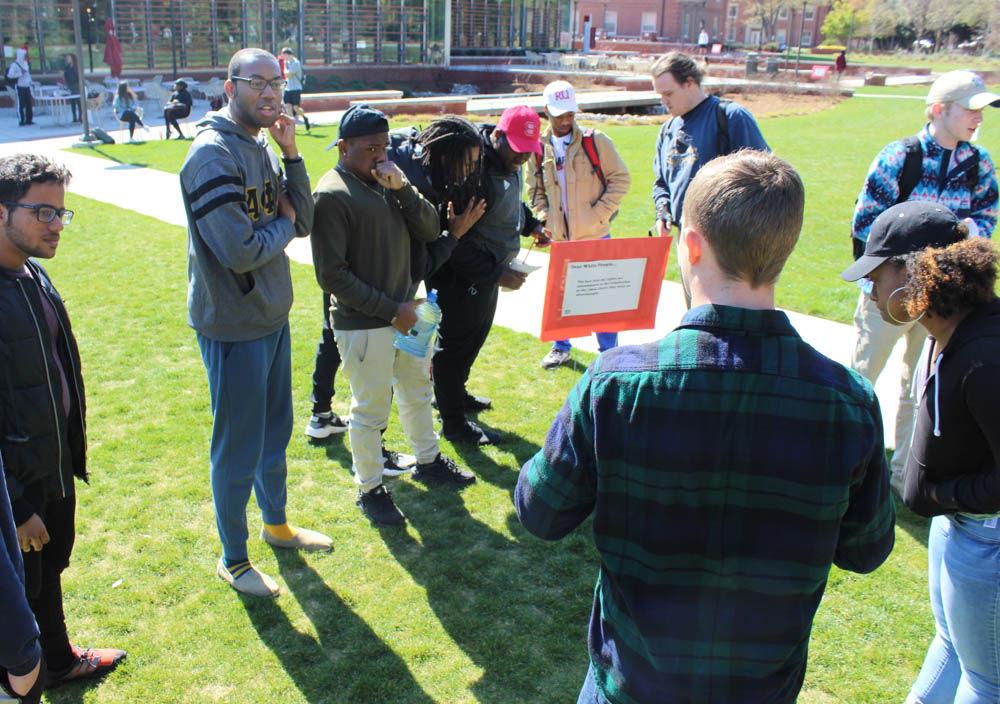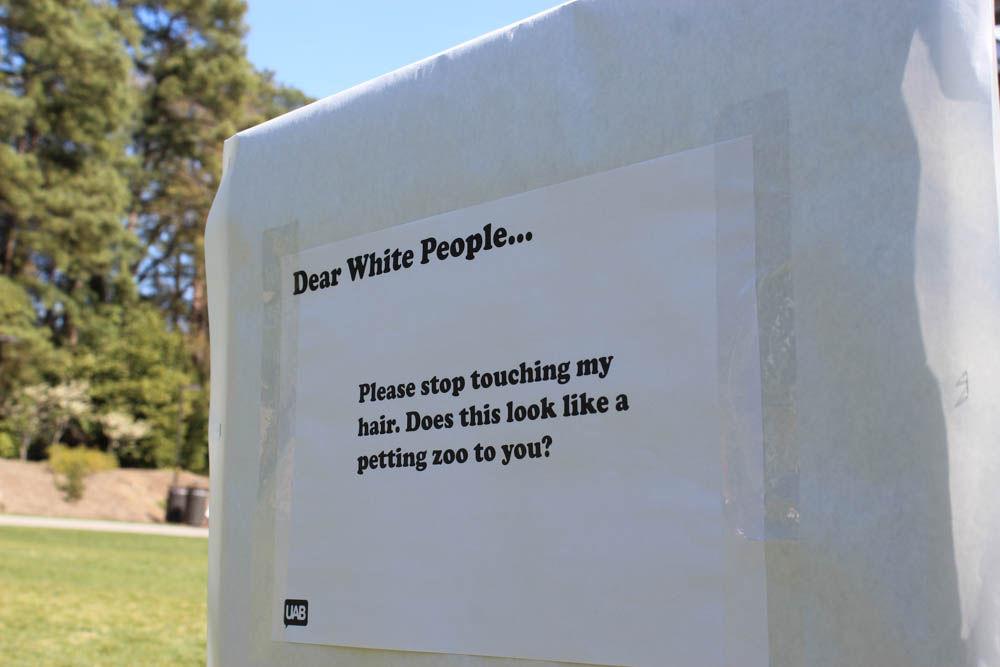Thursday night, the University Activities Board held a screening of “Dear White People,” a movie about black students’ experiences at a fictional, predominantly white university. Following the movie was a panel discussion, with some students coming to voice their concerns about the event. UAB also screened the film from 8 a.m. to 4 p.m. in Stafford Commons, accompanied by signs with quotes from the movie, all opening with the phrase, “Dear white people…”
UAB leadership received at least two email complaints from students who took offense to the signs, while other students took to Wolfpack Students to air their concerns publicly. After UAB screened the movie in the Witherspoon Campus Cinema, followed by a panel discussion, students also showed up to the discussion to share their thoughts with the audience and panel.
Before the evening screening, UAB’s Diversity Activities Board Chair Nyla Ruiz said in a Facebook post in Wolfpack Students that the signs were meant as a novel approach to promote dialogue about race. Ruiz, a senior studying biological sciences, also addressed students upset about the signs directly.
“You as a white person being upset because it’s in your face and you don’t want to deal with it, talking about this is ‘reverse racism’, which doesn’t exist, that is the epitome of white privilege,” Ruiz said in the post.
After the evening screening, the panel, which included student leaders and university faculty and staff, opened by answering prepared questions on their initial thoughts about the film and how the struggles of the characters in the movie related to the struggles of people of color at NC State.
Among the subjects covered by the panelists were personal encounters with racial discrimination on and off campus, aspects of the movie that accurately reflected their own experience and the complexity of having a multiracial identity.
President-elect of UAB Kam Risku was on the panel. She spoke about the backlash to the event, and how it reflected a broader pattern on campus.
“[The backlash] is just one of many examples of students of color, especially black students, expressing themselves in ways that is looked at as retaliation or negative when in fact it’s just a freedom of speech,” said Risku, a junior studying political science.
Students were then invited to ask questions to the panel at a microphone at the front of the cinema. Assistant professor of psychology Elan Hope answered a question about “reverse discrimination,” which one student said was being used by students complaining about the signs.
“People may feel that there’s prejudice against them and may feel upset by the signs; that’s their legitimate feelings,” Hope said. “Is it a systematic type of oppression based on culture and laws…? No.”
Student questions continued, with one about colorism, which is discrimination against individuals with a darker skin tone than is typical among people of the same ethnic or racial group. Another student asked about the disparity between the common usage of the term “racism” and its scholarly definition.
Jordan White, a senior studying business administration, brought up his disagreement with the UAB’s signs. After explaining his own understanding of the word “racist,” he asked Hope whether somebody who’s “not white” in America can be racist.
“In America today? No,” Hope said. “Prejudiced? Yes. Biased? Yes. Racist? No. And, to further your question, can one white person in America today be racist? No.”
After Jordan White finished his questions and comments, his brother Jeremy White, a facilities maintenance technician for NC State’s utilities and engineering services, also spoke. He expressed his disapproval for the signs on Stafford Commons, calling them “disgusting,” and responded to the idea of America having a system of racism.
“I’m not saying there was never racism in America,” Jeremy White said. “Look at history, obviously these things happened. We’re past that point. There’s always going to be individual racism somewhere. The idea that the whole country by itself right now is racist is ludicrous.”
Jeremy White continued his remarks, at one point attacking the event itself.
“Tuition money is going to dumb stuff like this,” Jeremy White said.
After a vocal audience response, Hope implored the audience to let Jeremy White speak.
“This is important that you respect his time at the microphone and let him speak,” Hope said.
Jeremy White also refuted the idea of white privilege. Risku responded to Jeremy White’s statement about students paying for the event, downplaying the cost of the UAB fee and per-student cost of the event, which she estimated to be about 75 cents.
“This one program made you upset and I understand that, but there’s a lot of other opportunities and spaces for you to feel comfortable and safe to learn some more,” Risku said.
After Jeremy White finished, students and panelists spoke about personal experiences with discriminatory behavior, media portrayals of black people and homophobia in the black community.
UAB Vice President of Communication Lexi Hudson, a senior studying business administration, spoke in response to the earlier question about reverse racism, sharing part of an essay by Tim Wise, an anti-racist activist and writer.
UAB Director of Social Media Imani Starling-Brown, a sophomore studying fashion and textile management, went to the microphone to speak publicly to Jeremy White, who had since left, apologizing for being among the people who interrupted as he was speaking.
“I want everyone to feel like they can come to this space and learn,” Starling-Brown said. “I want people to feel like they won’t be attacked when they do come into these spaces because I respect the fact that he even came.”
After Starling-Brown left the microphone, the audience moved upstairs to a conference room in the African American Cultural Center. The discussion continued there, covering topics such as the experience of being a part of both the black and LGBT communities, the privileges afforded to black people who are straight and/or Christian, and the historical underpinnings of modern systems of oppression.
Michael Hoxie, a junior studying biological sciences, responded to a comment about colorism by saying that he believed such prejudice is related to “preferences.” He later clarified his comment.
“I disagree that it’s all socialized,” Hoxie said. “I’m actually studying biology, and I think there’s actually a lot of biological evidence that we have preferences for people who look like us.”
Hoxie also said that the forum left some people with a “different view” on the matter of race feeling uncomfortable to speak publicly.
“This whole time, there is not this freedom of opening up and being able to share your opinions,” Hoxie said. “It’s really attacking and maligning people because they have a little bit of a different view.”
After he finished his comments, the moderator asked the audience to move onto another subject. Another participant later responded to Hoxie by describing colorism as another form of racism. Risku also responded to Hoxie.*
“If you actually study biology, you know that race is a social construct; it’s not biological,” Risku said.* “Race isn’t a real thing; it’s something white people made up to make people of color feel inferior … so, I think you should go back and study some more biology.”
After almost two hours of discussion following the movie, the UAB and the AACC drew the event to a close.
*Editor’s Note: This story originally misattributed a quote from Dawn Morgan.
A sign from the "Dear White People" demonstration sits on Stafford Commons on Thursday. The event was sponsored by UAB Films and was intended to spark discussion about common racial stereotypes.









